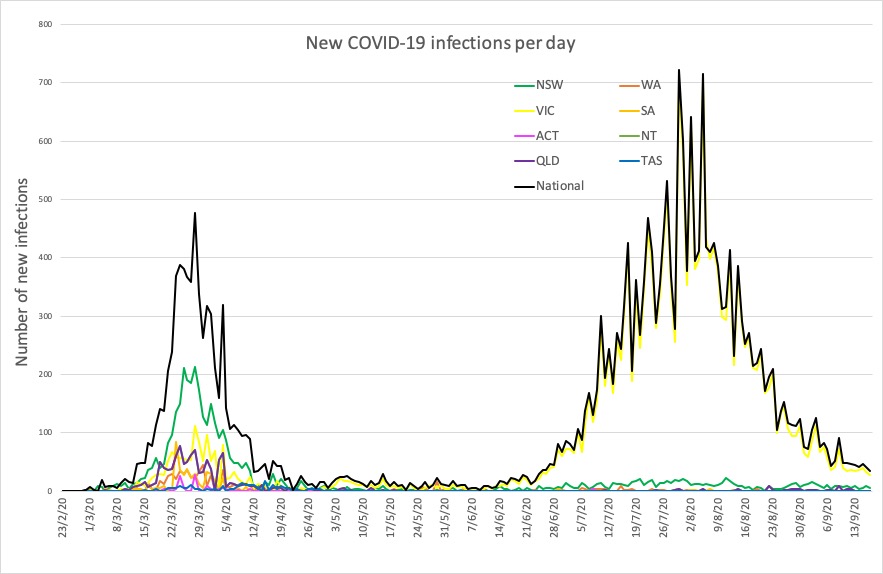Pregnant women with COVID-19 who are admitted to hospital for any reason should be treated prophylactically with anticoagulants, unless contraindicated.
Welcome to The Medical Republic‘s COVID Catch-Up.
It’s the day’s COVID-19 news in one convenient post. Email bianca@biancanogrady.com with any tips, comments or feedback.
18 September
- Prophylactic anticoagulants recommended for pregnant women with COVID-19 admitted to hospital.
- One in ten pregnant women with COVID-19 admitted to intensive care, study finds.
- COVID-19 prevalence of 50% could knock years off average life expectancy at birth.
- NACCHO puts out updated guidance on COVID-19 for Aboriginal and Torres Strait Islander communities.
- Latest confirmed COVID-19 infection numbers from around Australia.
- Pregnant women with COVID-19 who are admitted to hospital for any reason should be treated prophylactically with anticoagulants, unless contraindicated, according to the latest update from Australia’s National COVID-19 Clinical Evidence Taskforce.
The taskforce noted the increased risk of venous thromboembolism in pregnancy, and the increased risk associated with COVID-19. They recommended prophylactic use of low molecular weight heparin – for example, enoxaparin or dalteparin – for at least 14 days after the patient is discharged from hospital or until their COVID-19-related symptoms, such as immobility or shortness of breath, has resolved.
The update also recommended daily dexamethasone– either intravenously or orally – for up to 10 days for management of adults with COVID-19 who are receiving oxygen therapy. - Another COVID-19-in-pregnancy study suggests that around one in ten COVID-19-positive pregnant women are admitted to intensive care, and nearly one in ten overall require intubation.
The multinational retrospective cohort study, published in Ultrasound in Obstetrics & Gynecology, looked at outcomes in 388 singleton pregnancies. Overall, 94.4% resulted in a live birth, but 26% of 299 births were preterm, 2.3% ended in stillbirth, and there were six cases of spontaneous abortion.
There were three maternal deaths and five neonatal deaths. Three of the neonates who died were born preterm, and two died after developing late-onset sepsis. Among the maternal deaths, one occurred in a woman who experienced a stillbirth at 33 weeks, one in a woman who presented at 34 weeks with severe shortness of breath. The third woman developed severe pre-eclampsia.
The authors commented that prevention and control of COVID-19 among pregnant women is a major concern for obstetricians, but evidence on the issue was limited and recommendations are mostly based on case reports and expert opinions.
“Data published so far showed that COVID-19 in pregnant women was associated with a relatively high rate of preterm birth, and caesarean delivery, but no evidence of vertical transmission or maternal death,” they wrote. - Just a 10% prevalence of COVID-19 across the population would lead to at least a one-year reduction in average life expectancy at birth in areas such as North America, Europe, and Latin America, according to a study published in PLOS ONE.
Allowing for the uncertainties about infection fatality rates, the modelling study found that if COVID-19 spreads to half the population, life expectancy could drop by anywhere from three to nine years in North America and Europe, one to four years in sub-Saharan Africa, and two to seven years in South-East Asia.
If COVID-19 prevalence can be kept below 2%, the suggested it would not have a substantial impact on life expectancy. - The National Aboriginal Community Controlled Health Organisation has updated its COVID-19 website with new resources and recommendations to support healthcare workers in the prevention and management of COVID-19 for Aboriginal and Torres Strait Islander peoples.
The recommendations, which are continually being updated, address questions such as how to support individuals to meet the requirements of isolation and quarantine, healthcare and quarantine measures for healthcare workers travelling to and from remote communities, minimising risk of infection for healthcare workers, and best practice for transporting patients without suspected or confirmed COVID-19. - Here are the latest confirmed COVID-19 infection numbers from around Australia, to 9pm Thursday:
National – 26,813 with 832 deaths
ACT – 113 (0)
NSW – 4190 (5)
NT – 33 (0)
QLD – 1150 (1)
SA – 466 (0)
TAS – 230 (0)
VIC – 19,970 (28)
WA – 661 (1)



